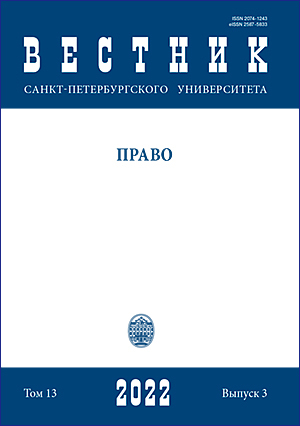Международное сотрудничество в борьбе с киберпреступностью в контексте противодействия новым вызовам и угрозам
DOI:
https://doi.org/10.21638/spbu14.2022.306Аннотация
Статья посвящена исследованию уголовно-процессуальных и других организационно-правовых аспектов международного взаимодействия государств в борьбе с киберпреступностью в условиях противодействия новым вызовам и угрозам. Цель исследования состоит в выявлении и рассмотрении формальных и неформальных мер международного сотрудничества, предпринимаемых в ответ на проблему транснациональной киберпреступности. Продемонстрировано, что такие преступления, как правило, носят международный характер, поскольку имеют негативные последствия на территории других суверенов. Автор анализирует различные формы международного сотрудничества в борьбе с преступностью, которые включают выдачу (экстрадицию), правовую помощь по уголовным делам, передачу уголовного преследования (судопроизводства), а также неофициальное сотрудничество между правоохранительными органами (международное полицейское сотрудничество), в частности в рамках такого закона США, как CLOUD Act. В качестве эмпирической базы исследования использованы материалы российской оперативной и следственной практики за 2018–2019 гг. и решения судов иностранных государств. Делается вывод, что большинство правоохранительных органов при расследовании киберпреступлений умышленно или без умысла прибегают к практике получения доказательств, физически находящихся на территории других государств, самостоятельным путем, не получив на это согласие данных государств. Это происходит посредством дистанционного подключения в режиме реального времени к абонентскому устройству уголовно преследуемого лица или изъятия такого устройства у потерпевшего или свидетеля, находящегося на территории государства, правоохранительные органы которого ведут производство по делу о киберпреступлении, с последующим осмотром для отыскания информации, имеющей значение для дела, а также путем применения иных законных методов.
Ключевые слова:
киберпреступность, международное сотрудничество, юрисдикция, электронная информация, поставщик услуг, правовая помощь
Скачивания
Библиографические ссылки
Загрузки
Опубликован
Как цитировать
Выпуск
Раздел
Лицензия
Статьи журнала «Вестник Санкт-Петербургского университета. Право» находятся в открытом доступе и распространяются в соответствии с условиями Лицензионного Договора с Санкт-Петербургским государственным университетом, который бесплатно предоставляет авторам неограниченное распространение и самостоятельное архивирование.






